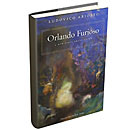Something about the subject of translation seems to unhinge vulnerable minds. A case in point is David Bentley Hart’s review (Commonweal, July 16, 2010) of David Slavitt’s translation of Orlando Furioso , Ludovico Ariosto’s masterpiece, a massive narrative poem published between 1516 and 1532 and never finally completed, as the poet continued to expand upon and tinker with his work.
Hart devotes the first half of his piece to a warm appreciation of Ariosto before turning “reluctantly” to Slavitt’s translation, published last fall by Harvard University Press. (Reluctantly, huh? Like his arm had to be twisted to review it?) From Hart’s comments on earlier translations, including “John Harington’s splendid edition of 1591” (my own introduction to Ariosto, directed there by some comments from Anthony Powell: like Hart, I relished it) and “two faithful and readable” versions from recent decades (Guido Waldman’s prose translation and Barbara Reynolds’ in verse), it is clear that he is able to read Ariosto’s Italian, an admirable attainment that I don’t share.
Hart makes much of the fact that Slavitt’s verse translation is an abridgement, going so far as to suggest that it is deceptively presented: “One would never know from the book’s cover that this edition of the Furioso is an abridgement.” True, but if one turns to the translator’s preface, at the very beginning of the book, Slavitt is quite clear: “What we have in this volume is slightly more than half of what Ariosto wrote.” Hart remarks that “it is as if Slavitt simply grew fatigued with the whole project and began hacking off great portions at random.” But Slavitt has said, in a PRI podcast interview (“Of Naked Maidens and Sea Serpents,” aired February 2, 2010), that he translated the entire poem; we may hope for an affordable e-book of the whole caboodle in due course.
Hart’s peevishness is unpersuasive. But quite apart from that, he seems to have a very shaky grasp of the nature of translation, perhaps because he is so accustomed to reading whatever he reads in its original language. Harington’s Renaissance verse translation and Waldman’s trot offer two radically different versions of Ariosto’s poem, each with its own strengths and weaknesses. I have already expressed my enthusiasm for Harington, but his end-stopped lines grow tedious unless taken in small doses, and his rhyme-driven inversions of syntax are sometimes wearisome, sometimes inadvertently funny. I can’t imagine anyone reading Waldman except for the purpose that prompts me to keep a copy on hand: so that I will be on sure ground as I follow the rapidly shifting action in a verse translation. (I simply want to know, roughly, what’s happening.) I haven’t read Reynolds’ Orlando because I know from earlier encounters that she’s a translator whose style I don’t find congenial, but I am sure that a comparison of her version with Harington’s, say, would reveal wide variations in tone and interpretation.
If Hart finds Slavitt not to his taste, there can be no argument. But he doesn’t stop there. No, it seems that Slavitt is an incompetent versifier, a writer of “laborious doggerel” whose “vaudevillean antics are utterly alien to Ariosto’s voice.” My, my: such huffing and puffing. In the course of Slavitt’s version I encountered stanzas that fell flat or seemed strained in their humor (including the first of the two stanzas that Hart quotes from this very large book). I also found many stanzas that seemed to catch Ariosto’s spirit insofar as I have been able to grasp it from Harington and from the seductive accounts of Orlando in writers as various as C. S. Lewis (his tribute will make you want to start reading tonight) and Italo Calvino. No matter what version I am reading, much remains elusive. There is a strong vein of parody in Orlando, but it is not always easy to recognize when the parody switch is on and how far the dial has been turned. I suspect this is true even for those who read the poet in his native tongue.
Meanwhile, today’s mail has brought a copy of a lovely little book from Harvard: David Slavitt’s translation of Dante’s La Vita Nuova. I’ll read it tonight. Memo to my fellow editors: if you get a call from David Bentley Hart, reluctantly eager to review this, you might want to think twice.
John Wilson is the editor of Books & Culture.
Copyright © 2010 Books & Culture. Click for reprint information.










